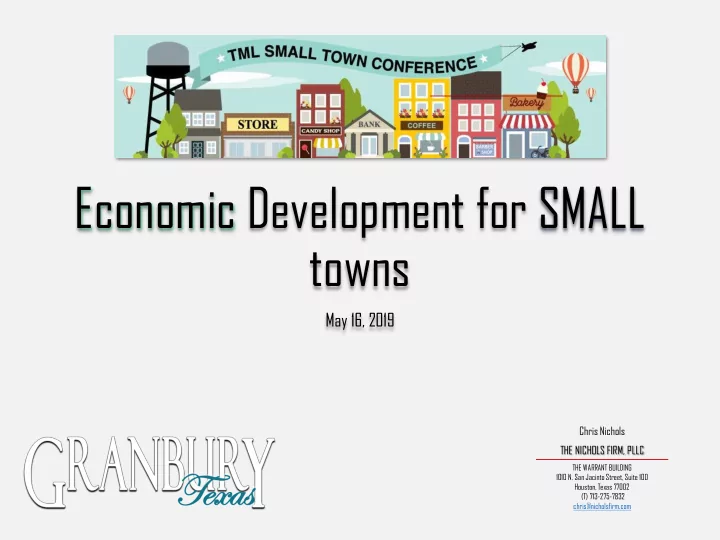

Economic Development for SMALL towns May 16, 2019 Chris Nichols THE NICHOLS FIRM, PLLC THE WARRANT BUILDING 1010 N. San Jacinto Street, Suite 100 Houston, Texas 77002 (T) 713-275-7832 chris@nicholsfirm.com
What is ec economic d dev evel elopmen ent? • What is a SMALL town? •
What is ec ent? economic d dev evel elopmen • TEDC: “…bringing new investment and jobs to Texas.” • TXEDC: “…marketing and promoting [YOUR CITY] as a premier business location.” • Pursuing business expansion and relocation • Developing job creation / retention • Increasing the ad valorem / sales tax base • What is a SMALL town? • LGC Sec. 505.158: • Municipality with population of 20,000 or less • For today: towns / cities with populations of 15,000 or less •
Where do cities get their money? Property Taxes: 35% 35 Sales Taxes: 28% 30 25 Franchise Fees: 8 % 20 15 Permits / Fees: 6% 10 Fund Transfers: 7% 5 0 Court Fines: 3% Interest Earnings: <1% Fed./State Grants: <1% Other Sources: 12%
PROPERTY TAXES : 2 ways to increase • Raise the tax rate (very unpopular; may be soon capped??) • Expand the tax base (somewhat unpopular) • Tax Abatement • Ch. 312 – detailed legal process; requires agreement • Only affects increased appraised value (new / expanded dev.) • 10-year maximum • Somewhat controversial – why give it away? • Expires Sept. 1, 2019; H.B. 360 – Sept. 1, 2029 (if passed)
PROPERTY TAXES: 2 ways to increase • Expand the tax base (cont.) • Tax Increment Financing (TIF / TIRZ) • Ch. 311 – detailed legal process; reinvestment zone; board • Applicable to all designated taxpayers in the ”TIRZ” • Tax increment = base value – increased appraised value • Tax increment earmarked for certain projects that are approved as part of a ”Project Plan” • Municipal oversight to determine who gets what • Can negotiate participation by other taxing jurisdictions
SALES TAXES : • Sales tax for general revenue • Can be spent on anything other than payment of debt • Adopted by election • Used to be set at 1% - no higher and no lower (but not anymore due to H.B. 157 (2015) • Sales tax for dedicated purposes • Can only be spent for specific purposes: economic development, street maintenance, crime control & prevention, property tax relief, etc. • All must be adopted by election • Cannot exceed 2% total cap
SALES TAXES : Expansion Options • Sales Tax Abatement • Three methods: • Neighborhood Empowerment Zone – Loc. Gov’t Code Ch. 378 • State Enterprise Zone – Gov’t Code Ch. 2303 • Ch. 380 Agreements (a whole presentation of its own) • Ch. 380 Agreements • Local Gov’t Code Ch. 380 • By far the broadest economic development tool
SALES TAXES (& permits / fees): Ch. 380 Agreements • Local Gov’t Code Ch. 380 • By far the broadest economic development tool • Requirements: • Economic development “program” (Resolution / Ordinance) • Written agreement with terms / performance benchmarks • Clawbacks, guaranties, liens, etc. (Ways to get your money back!)
WHAT ABOUT LAND? • Selling: • Local Gov’t Code Ch. 272 – Sec. 272.001(a) • Public bid • Little to no control beyond existing land use regulations • Gifting / Exchanging: • Local Gov’t Code Ch. 272 – Sec. 272.001(b)(4) • ”Choose” your (re)development partner • FMV according to appraisal • Need an independent foundation (an EDC would work) • Paper intensive
ECONOMIC DEVELOPMENT CORPORATIONS: • Loc. Gov’t Code – Chapters 501-505 • Dedicated Sales Tax • EDC Type (A or B) dictates available projects • Type A: • Cannot spend money on retail economic development; primarily fund projects that attract “Primary Jobs” • Type B: • Can fund commercial and retail projects in cities under 20,000 in population or less than $50k in annual tax receivables • A/B: Both can spent $$ on infrastructure that promotes business, including retail development
ECONOMIC DEVELOPMENT CORPORATIONS: Loc. Gov’t Code Sec. 505.158. PROJECTS RELATED TO BUSINESS DEVELOPMENT IN CERTAIN SMALL MUNICIPALITIES. (a) For a Type B corporation authorized to be created by a municipality with a population of 20,000 or less, "project" also includes the land, buildings, equipment, facilities, expenditures, targeted infrastructure, and improvements found by the corporation's board of directors to promote new or expanded business development. (b) A Type B corporation may not undertake a project authorized by this section that requires an expenditure of more than $10,000 until the governing body of the corporation's authorizing municipality adopts a resolution authorizing the project after giving the resolution at least two separate readings.
MUNICIPAL DEVELOPMENT DISTRICTS: • Loc. Gov’t Code – Chapter 377 • Dedicated Sales Tax • More flexible than Type B EDC • ”Type B EDC on steroids” • MDD sales tax may be levied in the ETJ • Governing board – 5 members
RESOURCES: • Texas Economic Development – Governor’s Office • https://gov.texas.gov/uploads/files/business/IncentivesOvervie w.pdf • Texas Economic Development Council (TEDC) • https://texasedc.org/ • Texas Economic Development Corporation (TXEDC) • https://businessintexas.com/about/txedc
THANK YOU! THE NICHOLS FIRM, PLLC LOCAL GOVERNMENT | ECONOMIC DEVELOPMENT | COMMUNITY ASSOCIATIONS THE WARRANT BUILDING 1010 N. San Jacinto Street, Suite 100 Houston, Texas 77002 (T) 713-275-7832 chris@nicholsfirm.com
Recommend
More recommend